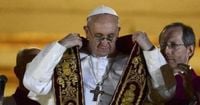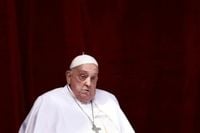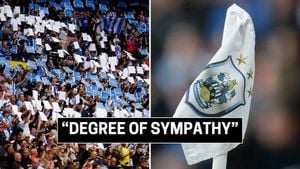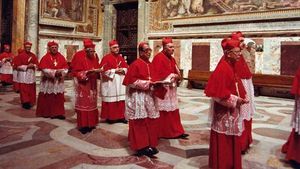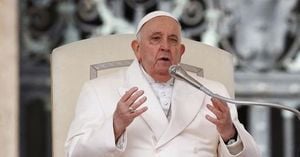The Vatican announced on Monday, April 21, 2025, the death of Pope Francis, who will enter a period of mourning and increased security. The news was delivered with great solemnity by Cardinal Kevin Farrell, who stated on Vatican Television, "With sadness and sorrow, we announce the death of His Holiness Pope Francis." The announcement came at approximately 7:35 AM Rome time, marking the end of a papacy characterized by significant reforms and a commitment to social justice.
Pope Francis, born Jorge Mario Bergoglio on December 17, 1936, in Flores, Buenos Aires, Argentina, was 88 years old at the time of his passing. He had battled health issues throughout his life, which were exacerbated by a severe respiratory infection that led to complications from a chronic lung condition. Earlier this year, he was hospitalized for 38 days to treat an acute respiratory infection that escalated into pneumonia.
Francis ascended to the papacy on March 13, 2013, after the resignation of Pope Benedict XVI. His election was historic, as he became the first Pope from Latin America and the first Jesuit to hold the position. His selection of the name "Francis" was a nod to St. Francis of Assisi, reflecting his commitment to the poor and marginalized.
Throughout his papacy, Francis was known for his humility and simplicity. He famously chose to live in a guesthouse rather than the opulent papal apartments, often cooking his own meals. His approachability endeared him to many, as he often said, "My people are poor, and I am one of them," emphasizing his dedication to serving the underprivileged.
During his tenure, Pope Francis initiated a series of reforms aimed at modernizing the Church and addressing various social issues. He established a council of cardinals to oversee financial matters within the Vatican, a move aimed at increasing transparency and combating corruption, particularly within the Vatican Bank. His efforts to reform the Church's financial practices were met with both support and criticism, particularly from conservative factions within the Church.
On the international stage, Francis played a pivotal role in improving diplomatic relations between the United States and Cuba, facilitating dialogue that led to significant policy changes. He also signed an agreement with China regarding the appointment of bishops, a move that was seen as a significant step in managing the Church's relationship with the Chinese government.
In addition to his diplomatic efforts, Pope Francis was a vocal advocate for the rights of immigrants and refugees, framing their protection as a "duty of hospitality." He frequently called for compassion and understanding towards those fleeing conflict and persecution, urging the global community to respond with empathy.
Francis's papacy was not without its challenges. He faced considerable pushback from conservative groups within the Church who resisted his progressive stances on issues such as divorce, same-sex relationships, and the role of women in the Church. Despite these challenges, he remained steadfast in his belief that the Church must evolve to meet the needs of contemporary society.
His environmental advocacy was encapsulated in his encyclical, "Laudato si’," in which he condemned the destruction of nature and called for collective responsibility in caring for the planet. This message resonated widely, particularly in light of growing concerns about climate change.
As his health declined in recent months, Pope Francis continued to engage with the public, though he increasingly relied on a wheelchair or cane for mobility. His resilience in the face of health challenges was a testament to his dedication to his role as the spiritual leader of the Catholic Church.
With the death of Pope Francis, the Vatican now enters a period known as the "See of the Vatican," a ceremonial phase that involves mourning and the preparation for the election of a new pope. This phase includes the traditional breaking of the Fisherman’s Ring, a symbol of the papal authority, and a period of heightened security as the cardinals prepare for the conclave to elect Francis's successor.
During this transitional time, the cardinals, particularly senior clergy, will manage the daily affairs of the Church. It is customary for a new pope to be elected within three weeks of the previous pope's death, a process that involves intense deliberation and prayer among the cardinal electors.
The legacy of Pope Francis will undoubtedly leave a lasting impact on the Catholic Church and its followers worldwide. His efforts to foster inclusivity, promote dialogue, and advocate for social justice have reshaped the Church's image in the modern world. As the Church reflects on his contributions, many will remember him not only as a religious leader but also as a champion of the marginalized and a voice for peace in turbulent times.
In summary, the passing of Pope Francis marks a significant moment in the history of the Catholic Church. His unique approach to leadership and commitment to reform have set a new course for the institution, one that future popes will likely continue to navigate as they address the challenges and opportunities of a rapidly changing world.
